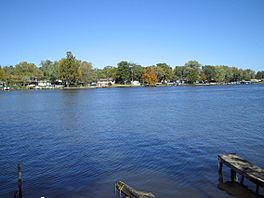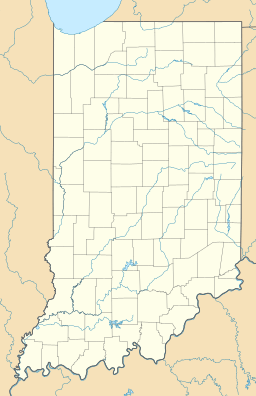Lake Shafer facts for kids
Quick facts for kids Lake Shafer |
|
|---|---|
 |
|
| Location | White County, Indiana, United States |
| Coordinates | 40°49′47″N 86°47′54″W / 40.8297°N 86.7983°W |
| Type | reservoir |
| Primary inflows | Tippecanoe River |
| Basin countries | United States |
| Max. length | 16.1 km (10.0 mi) |
| Surface area | 5.22 km2 (2.02 sq mi) |
| Average depth | 3.05 m (10.0 ft) |
| Max. depth | 9.14 m (30.0 ft) |
| Water volume | 16×106 m3 (13,000 acre⋅ft) |
| Surface elevation | 191 metres (627 ft) |
| Settlements | Monticello, Indiana |
Lake Shafer is a large reservoir (a human-made lake) located near Monticello, Indiana. It is one of two "Twin Lakes" in the area, the other being Lake Freeman. Both lakes were created in the 1920s when dams were built on the Tippecanoe River. Lake Shafer is a very popular spot for fun activities and helps bring in lots of money from tourism for White County.
Contents
How Lake Shafer Was Made
Building the Norway Dam
The creation of Lake Shafer started in 1922. Workers began building the Norway Dam on the Tippecanoe River. This dam is about one mile north of Monticello. The dam was finished in June 1923. It helped to hold back the river's water, forming Lake Shafer.
A Hub for Fun and Tourism
Lake Shafer is known as the more active of the Twin Lakes. This is because it is home to the famous Indiana Beach Amusement Park and Camp Resort. Many people visit the lake for vacations. You can find lots of rental cottages and homes here. There are also places to rent boats and enjoy the water.
Busy Summer Weekends
Many people who live near Lake Shafer are "part-timers." This means they spend most of their time at the lake on weekends. The busiest time is usually from April through October. The lake can get very busy with boats during summer weekends. This is due to all the tourists who come to visit.
Understanding Lake Shafer's Environment
Sediment and Shallow Areas
Lake Shafer is part of the Tippecanoe River system. This means it naturally collects sediment, which is like dirt and sand carried by the river. Over time, these sediments have made some parts of the northern lake shallower. Some areas are now only about 4 feet deep.
Keeping the Lake Deep: Dredging Efforts
Since 2004, people have been working to make the lake deeper. They use a process called dredging. This involves removing sandbars and debris from the bottom of the lake. Dredging helps to keep the lake deep enough for boats and swimming.
Draining the Lake for Dam Repairs
From time to time, Lake Shafer needs to be drained. This is done so that important repair work can be made to the Norway Dam. The lake has been drained several times in the past for these repairs. For example, it was drained in 1965, 1975, 1985, and 1995.
In late April 2008, Lake Shafer was drained again for dam repairs. The water level was lowered by 3 feet on April 26–27. It was then lowered by 6 feet by May 3–4. During these times, only the main riverbed remained visible.
 | Bayard Rustin |
 | Jeannette Carter |
 | Jeremiah A. Brown |



